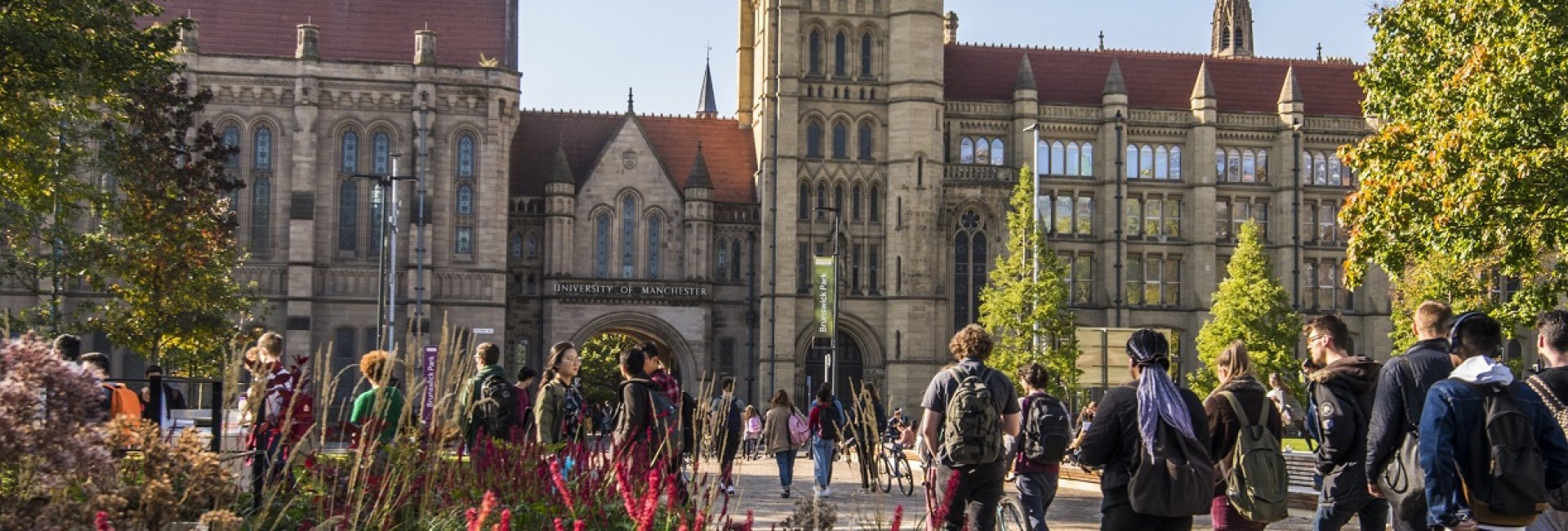The University of Manchester Open Day: in person / on campus
21 Jun 2025, 09:15
Manchester

BA History and Spanish provides you with the opportunity to study aspects of history that interest you most, from ancient, medieval, modern, and economic and social history, to the history of science, technology and medicine.
You will also develop a thorough grounding in the language and culture of the Spanish-speaking world as well as the opportunity to learn Catalan.
History
We offer one of the most diverse history courses in the UK, with our course units covering almost all of human history, including British, European, American, Asian and African history, and ranging from the classical era (Greece and Rome), through the medieval and modern periods, to the late 20th century.
We offer a wide variety of approaches to history, from political and economic history, to gender, social, cultural, and colonial history.
You will benefit from studying in the historically rich city of Manchester; itself is a living history book - from Peterloo to the anti-slavery movement, and from Roman and Anglo-Saxon forts to medieval monuments.
You can draw on the abundant library, archive and museum holdings of the local area, including Chetham's Library, The Museum of Science and Industry, The People's History Museum and the Working Class Movement Library.
You will also have access to one of only five National Research Libraries, including the special collections of The John Rylands Library, as well as the exclusive holdings of Manchester Museum.
Spanish
Alongside your study of Spanish language, you will explore a range of options in visual culture (including film), area-specific history, linguistics and literature.
The breadth of expertise among staff across Spanish and Latin American Studies means an unusually rich and broad curriculum.
80% of our staff are first-language Spanish-speakers, and language courses are taught by native speakers with specific training.
You will also benefit from us working closely with the Centre for Latin American and Caribbean Studies and we maintain strong links with the Instituto Cervantes located here in Manchester.
The course unit details listed below are those you may choose to study as part of this programme and are referred to as optional units. These are subject to change and are the latest example of the curriculum available on this programme. Although language units may show here as optional, they are a mandatory part of your modern languages degree and you will take the units relevant to your level of language in each year of study. It is compulsory to study language at all levels of your modern languages degree.

Learn what it's like to study at University of Manchester. From key stats to campus highlights, open days, and more - find everything you need to know here.
This course is not accepting applications at this time. Please contact the provider to find out more.
The following entry points are available for this course:
The University recognises a number of foundation programmes as suitable for entry to this undergraduate programme:
Applicants completing the INTO Manchester in partnership with The University of Manchester international foundation programme are required to achieve AAB in academic subjects and grade B in the EAP with writing and speaking grade B and listening and reading grade C.
Applicants completing the NCUK International Foundation year are required to achieve AAB in academic subjects and grade B in the EAP with writing and speaking grade B and listening and reading grade C.
Please read this in conjunction with our A-level requirements, noting any pre-requisite subjects.
| Test | Grade | Additional details |
|---|---|---|
| IELTS (Academic) | 7 | 7.0 overall with no less than 6.5 in any one component |
Acceptable English Language Qualifications https://www.manchester.ac.uk/study/international/admissions/language-requirements/
We operate contextual admissions meaning many applicants receive an offer and are admitted at least one grade below standard entry requirements. Entry requirements for applicants meeting contextual admissions criteria are listed next to the standard entry requirements on course profiles.
Contextual admissions means we consider your application in context helping us to ensure everyone has a fair chance of getting into Manchester. The data we use is automatically provided on your UCAS form.
This section shows the range of grades students were previously accepted with - learn more. It is designed to support your research but does not guarantee whether you will or won't get a place. Admissions teams consider various factors, including interviews, subject requirements, and entrance tests. Check all course entry requirements for eligibility.
Students aged 17/18 who applied to this course were offered a place.
See how students with your grades have been accepted onto this course in the past.
Operated by the Office for Students
Employment after 15 months (Most common jobs)
Go onto work and study
The number of student respondents and response rates can be important in interpreting the data – it is important to note your experience may be different from theirs. This data will be based on the subject area rather than the specific course. Read more about this data on the Discover Uni website.
No fee information has been provided for this course
Tuition fee status depends on a number of criteria and varies according to where in the UK you will study. For further guidance on the criteria for home or overseas tuition fees, please refer to the UKCISA website.
Fees for entry in 2025 have not yet been set. For entry in 2024 the tuition fees were £9,250 per annum for home students, and are expected to increase slightly for 2025 entry.
Oxford Road
Manchester
M13 9PL
Visit our website Visit our course page
Email:study@manchester.ac.uk
Phone:+44 (0)161 275 2077